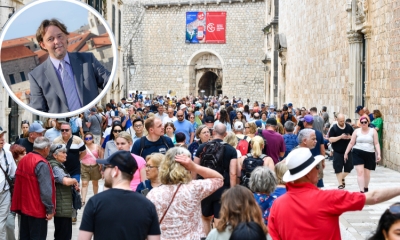“What do the locals think about tourists and tourism?” a British tourist asked me last week.
I was thinking ahead: was she relating it to the anti-tourism protests that have hit Mallorca and Barcelona recently, and to those we have already seen in Venice?
“Why do you ask?” I asked diplomatically. “Oh, it’s just because I’ve noticed that the staff in shops and restaurants are not very friendly. In fact, I get that they are bored with their jobs and don’t want to serve customers there,” she replied.
Ah, so you weren’t worried about being sprayed with water guns like the tourists in Barcelona have been causing.
“You could say it’s a love-hate relationship,” I laughed, adding, “Tourism in general gives on the one hand and takes away on the other.” This is essentially the root of the protests in Spain.
I was talking to a friend who lives in Palma, the capital of Mallorca, and he said, “It’s not that people are against tourism. They’re against it for two reasons: first, because Airbnb apartments are making it impossible for locals to buy property, and second, because the real wealth from tourism goes to companies outside Spain.” Hmm, all of this sounds familiar.
Do you think we will see the same protests in Dubrovnik? No, it’s not likely. Why? Experience tells me that such a public mobilization is highly unlikely.
“It may not be fun to work in this heat, but a smile doesn’t cost anything,” the English woman added. I know exactly what she means. I have been the victim of overworked and underpaid waiters and shop assistants many times. I see how smiling and being friendly really makes you stand out. Is that how you should be? Definitely not! I seem to have become immune to bad manners.
A few days later, I found myself in another situation, surrounded by curious tourists, and once again faced the testing question:
“Is there an ‘us and them’ nation in Dubrovnik?” asked an Irish tourist.
I (incorrectly) assumed he was talking about the difference between locals and tourists, but I think he was actually talking about a situation where the wealth from tourism is concentrated in a few areas, creating a sort of medieval-style feudal system.
There is an argument to be made that we are indeed returning to an era of haves and have-nots. I have lived here for nearly 30 years and the gap in people’s financial assets — the wealth gap, as it is called — has never been so wide.
And as history has shown time and again, feudalism falls apart when the peasants, or rather the people, rebel. After the French Revolution, before Louis XVI was beheaded by the guillotine, a French princess cried out “Qu’ils mangent de la brioche” (Let them eat the brioche). In short, this is what is happening with the Spanish tourism industry, without the cake and the guillotine of course.
The mayor of Barcelona is not holding back.
He cites cruise tourism and short-term rentals as his main issues. Hmm, sounds familiar. So he plans to increase tourist taxes on people staying less than 12 hours, i.e. cruise ship passengers, and revoke the licenses of more than 10,000 apartments currently licensed as short-term rentals.
While these measures may raise the overall standard of living for locals during the tourist season, they do nothing to actually address the problem of concentrated wealth — and could actually deal a fatal blow to Barcelona’s tourism industry.
The line between success and failure is fine, but the line between a smile and a frown is even finer.
Continue reading British in Dubrovnik… well, if you really want to
————————————————– ————————————————– ————
About the Author
Mark Thomas (aka Englez u Dubrovniku) is the editor of the Dubrovnik Times. He was born and raised in England and moved to Dubrovnik in 1998. He has worked in a variety of media, from a daily radio show to television and print. Thomas is fluent in Croatian and his column can be read on the Croatian website Dubrovnik Vjesnik.

